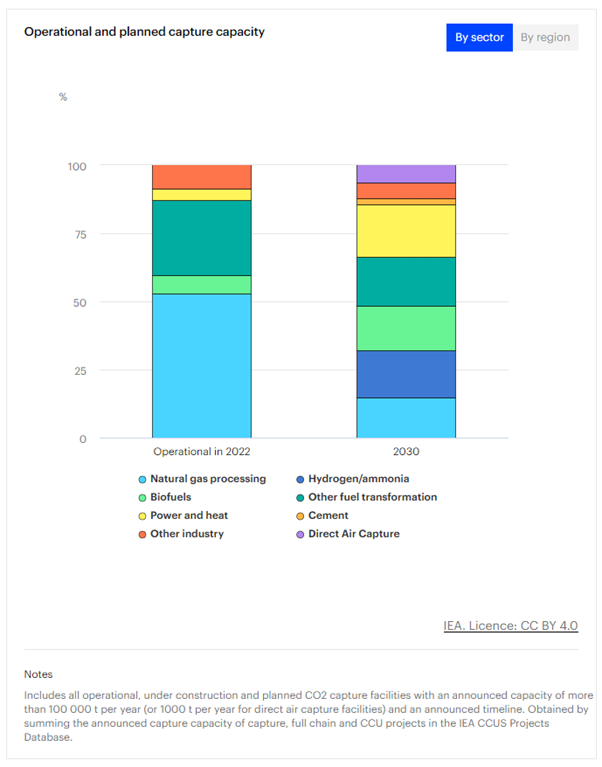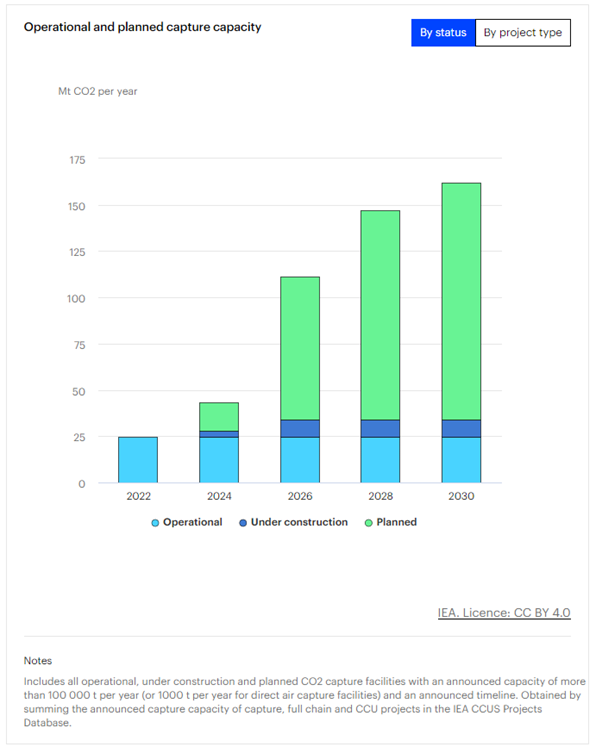Upcoming Carbon Capture and Storage Projects in the U.S. and Canada
09 May, 202313:52In the last five years, Carbon Capture and Storage (CCS) projects have become increas...

In the last five
years, Carbon Capture and Storage (CCS) projects have become
increasingly important worldwide in the fight against global warming.
The United States
is no exception, with several upcoming CCS projects set to launch in the coming
years. These initiatives aim to capture carbon dioxide (CO2) emissions produced
by power plants and other industrial facilities, preventing them from entering
the atmosphere and contributing to climate change.
These projects
promise to revolutionise the energy industry by reducing large-scale
operations' carbon footprint while creating new job opportunities and driving
economic growth.
There are many U.S.
policies and investments supporting decarbonisation as well. The
45Q Tax Credit through the Inflation Reduction Act offers between
$35-$50 per ton of CO2 captured, depending on how the carbon is stored or
reused. Various bills have been proposed and implemented to fund research and
development, particularly for Direct Air Capture (DAC) facilities and
sequestration well development.
In this article, we'll look at some of the most exciting upcoming CCS projects in the U.S. and explore their potential impact on the environment and the economy.


Source: IEA
1PointFive and Carbon Engineering are deploying a module Direct Air Capture (DAC) plant
1PointFive, a
subsidiary of Occidental's (NYSE: OXY) Low Carbon Ventures business, and Carbon
Engineering Ltd. (C.E.), a climate solutions company, announced
a Direct Air Capture (DAC) plant deployment approach to deploy DAC
projects globally.
By standardising
the modular design of DAC plants, the companies can mass-produce components and
transport them to the site to be built quickly and efficiently. C.E. and
1PointFive are optimising DAC technology to reduce the cost of carbon capture,
streamline the deployment of the technology, and ensure future upgrades can be
made quickly through a universal approach.
The partnership aims to deploy 70 DAC facilities by 2035, with an estimated 1m tonnes per year capacity. The first facility is being constructed in Texas, expected to be operational towards the end of 2024.

Michael Avery,
President of 1PointFive, said: "We are committed to delivering large-scale
DAC solutions to remove carbon dioxide from the atmosphere and help achieve the
goals of the Paris Agreement. We believe this deployment approach and our
partnership with C.E. will support the rapid, global deployment of DAC
facilities to meet the urgency of the climate challenge and growing customer
demand for DAC-enabled net-zero solutions."
Aemetis acquires 24 acres of decommissioned military base for zero-carbon projects
In July 2022,
Aemetis, a renewable energy company focusing on zero-carbon products,
purchased 24 acres on the Riverbank Industrial Complex site to develop
a CCS injection well.
The purchase is the
first part of a more extensive acquisition of California's 124-acre former U.S.
military base.
The purpose of the
well will be to obtain research data that will be used to design their
production well, which will sequestrate approximately 1m metric tonnes of CO₂
per year from biofuel production and agricultural sources if approved.
The Riverbank
facility is already home to over 30 existing businesses, powered by a local,
low-carbon hydroelectric plant. The site has received over $72m in federal
funding for facility upgrades since being decommissioned as a military base.
Air Products is planning a new blue hydrogen plant in Texas
Air Products will
invest $4.5bn to produce blue
hydrogen in Louisiana, providing the low-carbon fuel to oil refiners along
its U.S. Gulf Coast pipeline.
The project in Ascension Parish is set to become the world's largest carbon capture and storage project, storing about 5m metric tonnes of CO₂ per year more than a mile underground. The project joins over 20 hydrogen and blue hydrogen plants in Port Arthur, Texas. The existing network currently supplies oil refineries across Texas using hydrogen as a fuel purifier.

Air Products is
already set to be the world's largest hydrogen producer, with projects in
Louisiana and Alberta, Canada. In addition, the company has announced a $5bn
joint venture in NEOM, Saudi Arabia, to develop green hydrogen for the region.
B.P. and Linde partner to develop low-carbon CCS projects in Texas
B.P. and Linde
have announced
plans to further develop a CCS project at Linde's existing facilities
in Texas, allowing low-carbon hydrogen production at their existing facilities.
The project will support the storage of CO₂ captured from other facilities in Texas,
supporting the country's decarbonisation goals. The project is critical in
B.P.'s drive towards a low-carbon business model.
The project will
capture CO₂ from existing hydrogen production facilities owned by Linde and produce
low-carbon hydrogen for chemical and fuel production, to be sold on their
pipeline network.
The partnership
will see B.P. developing the storage sites for the CO₂
and providing low-carbon solutions for the project. At the same time, Linde
will use its technology and expertise to capture CO₂
from its hydrogen production facilities. The partnership will deliver an
end-to-end capture, storage and low-carbon hydrogen production chain.
Once completed in
2026, the final project is set to store as much as 15m metric tonnes of CO₂
per year.
Carbon America is developing two new CCS projects in Colorado
Carbon America has
recently signed agreements with Sterling Ethanol, LLC and Yuma Ethanol, LLC to
develop new CCS projects at two ethanol production facilities in Colorado.
These projects are the first of their kind in Colorado, which has set emissions reduction targets of 50% by 2030 and 90% by 2050, compared to 2005 levels. Carbon America's partnership is set to deliver on that objective by capturing and storing 95% of the CO₂ produced in the ethanol fermentation process at the two sites.

The carbon capture
equipment at the plants will extract CO₂ from the production process and permanently
transfer the gas into an underground storage site nearly a mile underground.
The projects at both facilities are due to be completed in 2024.
Chevron is developing a CCS project in California
Chevron Energies
division is developing a new CCS project in San Joaquin Valley, California, as
part of its broader strategy to reduce carbon emissions.
The project is set
to begin at Chevron's Kern River Eastridge plant initially while demonstrating
the technology's effectiveness at facilities for future projects.
Chris Powers, vice
president of Carbon Capture, Utilization, and Storage (CCUS) for Chevron New
Energies, said, "At Chevron, we believe the future of energy is lower
carbon. Reducing the carbon intensity of the energy people rely on day-in and
day-out is well-aligned with the ambitions of the Paris Agreement…We are
excited about the opportunity to collaborate and progress this CCS initiative
in San Joaquin Valley, a region where we have lived and worked for over a
century."
Cleveland Cliffs apply to the continuation of large-scale CCS research
Cleveland-Cliffs
Inc. declared that they have applied to the Department of Energy (DOE) to
continue research for the front-end engineering design for large-scale carbon
capture at their Burns Harbor integrated iron and steel facility in Indiana.
This project is
anticipated to collect 2.8m tonnes of CO₂ per year from blast furnace gas with a net
carbon capture efficiency of 95%. The engineering design is expected to be
accomplished within two years, and both Cleveland-Cliffs and the DOE will
provide financing for the study.
Competitive Power Ventures is moving forward on a natural gas station and CCS combined project
Competitive Power
Ventures has declared the construction of a $3 billion combined-cycle natural
gas power station with a 1,800-megawatt capacity and CCS in West Virginia.
The project has been made possible through the tax relief provided by the Inflation Reduction Act. It provides key investment alongside Virginia's legislation to encourage CCS projects and technologies in the state to support their decarbonisation goals.

When completed, the
plant's carbon capture system will be able to eliminate 90-95% of CO₂
from its emissions.
This technology is
in high demand as companies are looking to outfit natural gas power plants with
CCS to reduce emissions.
ExxonMobil and Mitsubishi Heavy Industries Join Forces to deploy CSS technology
ExxonMobil and
Mitsubishi Heavy Industries (MHI) have recently announced their plans to
leverage their combined engineering and operation experience to offer advanced
CCS solutions.
These products are
aimed at industrial customers with heavy current CO₂
emissions by providing an end-to-end capture, transportation, and storage
solution. The companies will work together to provide specific design,
construction and management of carbon reduction technologies, mirroring Exxon's
own goals of global carbon reduction across their operations in the
petrochemical industries across their plants.
ExxonMobil Low
Carbon Solutions is working alongside a significant producer of nitrogen and
hydrogen products in Louisiana on its decarbonisation strategy.
G.E. Gas Power awarded $57m to develop a CCS technology integration project
The U.S. Department
of Energy gave $57 million to a GE-led Carbon Capture Technology project. This
cutting-edge technology can reduce coal and natural gas power plant emissions.
Southern Company,
Linde, BASF, Kiewit, and G.E. Gas Power are collaborating to create a front-end
engineering design for combining carbon capture technologies with a natural gas
combined cycle plant. This project aims to reduce CO₂
emissions by 95%.
The United States
Department of Energy will award the group $5.8 million upon completion of the
award negotiation stage. Equipment upgrades are also planned to improve the
overall carbon capture process.
The study involves
developing upgrades and enhancements to G.E.'s 7F gas turbine fleet, the
largest fleet in the U.S. The objective is to improve the carbon capture
process through these turbines and reduce the CCS process's effect on power
output, equipment performance, and cost.
California-based startup using innovative limestone carbon capture technique
Heirloom, a startup
based in California, has a unique way of capturing atmospheric carbon dioxide.
They use limestone, which naturally contains CO₂, and extract it by
heating it into powder. The CO₂ is then stored underground, while the
remaining powder is spread out on trays to absorb more CO₂.
This process, which usually takes many years, only takes three days with Heirloom's approach. This cost-effective and scalable method makes it attractive to investors like Microsoft.

Heirloom plans to
deploy its first site in the coming year and aims to remove 1 billion tons of
CO₂ by 2035. The startup also sells carbon credits to companies like
Microsoft, Stripe, Shopify, and Klarna, allowing them to offset their CO₂
emissions.
Navigator CO₂ ventures and OCI partner to decarbonise fertiliser production
Navigator CO₂
Ventures LLC has recently announced its agreement with OCI NV's wholly-owned
Iowa fertiliser company facility for the transportation and storage of CO₂.
The company plans to construct one of Illinois's largest carbon capture and
storage pipelines as part of the Heartland Greenway project, which aims to
provide a long-term CO₂ storage solution to biofuel producers and
other industrial customers across five Midwest states.
The pipeline will span 1,300 miles across Illinois, Iowa, Minnesota, Nebraska, and South Dakota and is scheduled to commence operations in 2025. The initiative is expected to sequester 15 million metric tons of CO₂ annually when fully operational and expanded. The Iowa fertiliser plant is the largest in the state.
The Inflation Reduction Act supports the development of a new Wyoming DAC facility
CarbonCapture, a
company based in Los Angeles, has begun a large-scale direct air capture (DAC)
project called Project Bison in Wyoming. The company aims to capture and store
5 million tons of carbon dioxide annually by 2030 and will benefit from new
incentives from the U.S. government.
This marks a
significant milestone for DAC technology. It is the first major deployment of
its kind and the first to permanently store CO₂ underground in wells
approved by the federal government.
CarbonCapture CEO
Adrian Corless stated that the recent passage of a new law by Congress gave the
company and the DAC industry the financial support and long-term certainty
necessary to scale up the technology. It has accelerated the launch of Project
Bison by a few months.
Nonprofit Project Tundra awarded a $100 million loan to develop a CCS project in North Dakota
Minnkota Power
Cooperative has been granted a loan of $100 million from the North Dakota
Industrial Commission to support its Project Tundra carbon capture initiative
at the Milton R. Young Station.
The loan, which the
Bank of North Dakota will provide through the state's Clean Sustainable Energy
Authority (CSEA), will play a vital role in the project's capital financing
strategy.
After finishing the
final design and engineering work for Project Tundra, Minnkota will focus on
financing efforts in the coming months. The $1.45 billion project will be
funded mainly by federal 45Q tax credits, providing $50 per ton of CO₂
stored.
As a not-for-profit
organisation, Minnkota will need to collaborate with tax-equity investors to
utilise the credits. The project aims to store about 4 million metric tons of
CO₂ annually permanently.
Red Trail Energy LLC commences CCS in North Dakota
Red Trail Energy LLC has officially started carbon capture and storage (CCS) at its ethanol plant near Richardton, North Dakota. By implementing CCS technology, the ethanol produced by RTE now has a reduced carbon footprint compared to conventional ethanol sources, making it a more eco-friendly fuel option.

The ethanol plant
emits an average of 180,000 metric tons of CO₂ per year, captured
entirely by CCS technology, and approximately 500 metric tons of CO₂
are injected underground daily. The CO₂ is stored permanently more than a mile
beneath the surface in the Broom Creek formation. This move makes RTE more
environmentally responsible and enhances ethanol's value in the clean fuel
market.
Summit Carbon Solutions progresses ethanol refinery CCS project
Summit Carbon
Solutions has made significant headway in its carbon capture and storage
initiative by submitting a pipeline permit application to the Iowa Utilities
Board.
The project aims to
link ethanol biorefineries in five northern states - Iowa, Minnesota, Nebraska,
North Dakota, and South Dakota - with the largest part of the project, which
includes 12 ethanol biorefineries and over 680 miles of carbon dioxide pipeline
located in Iowa.
By capturing
and storing carbon dioxide emissions from partner ethanol biorefineries, Summit
Carbon Solutions expects to reduce their ethanol's carbon footprint by 50%,
promoting these facilities' environmental and economic sustainability over the
long term by creating new markets and boosting profitability.
Summit is currently
procuring right-of-way easements for the pipeline element of the project across
its five-state footprint, with the company having a strong agricultural
heritage.
Tallgrass awarded a grant to develop a CCS hub in Wyoming
The Wyoming Energy
Authority has awarded Tallgrass a grant to support the development of a CO₂
sequestration hub in eastern Wyoming's Denver-Julesburg Basin.
This grant is in
addition to Tallgrass's proposed direct investment in the Eastern Wyoming
Sequestration Hub, which aims to facilitate the capture, transport, and
sequestration of CO₂ across multiple states cost-effectively.
Tallgrass
anticipates using the grant to fund development activities and drill a
characterisation well in preparation for its Class VI permit filing for the hub
in 2022.
Brookfield Renewables pledges $500m initial investment to California CCS projects
California
Resources Corporation has partnered with Brookfield Renewable to create a joint
venture to develop CCS projects.
Brookfield Renewable has pledged an initial investment of $500 million to support CCS projects approved by the joint venture, which will be allocated through the Brookfield Global Transition Fund. The BGTF is the largest fund in the world dedicated to facilitating the transition to a net-zero carbon economy.

The Elk Hills
Field's 26R reservoir has been chosen as the first CCS project for development
and was added to the partnership by CRC at a value of $10 per metric ton. The
J.V. aims to inject 5 million metric tons per annum and develop 200 million
metric tons of carbon dioxide storage, in line with CRC's 2027 objectives.
Achieving this goal will need an estimated $2.5 billion of total capital.
Brookfield could invest more than $1 billion in the strategic partnership since
it fully participates in these CCS projects.
How NES Fircroft is supporting the CCUS Industry
In this blog, we’ve
looked at CCUS projects in just the US. Still, the need for decarbonisation is
global, and businesses
worldwide are developing carbon capture facilities and sequestration
wells to meet increasingly stringent climate targets. This list is only likely
to grow with facilities being in various stages of development across the US,
Europe, the Middle East, China and Australia in particular. NES Fircroft will
continue to report on these developments regularly in our blog and support
clients and candidates to fill roles in new and existing projects across the
globe.
NES Fircroft’s
expert recruitment teams recruit engineering and technical professionals for
global roles with some of the biggest names in the energy sector. You can view all our open vacancies or register your CV with us today for free to ensure
you’re first in line for future jobs in this expanding industry.









